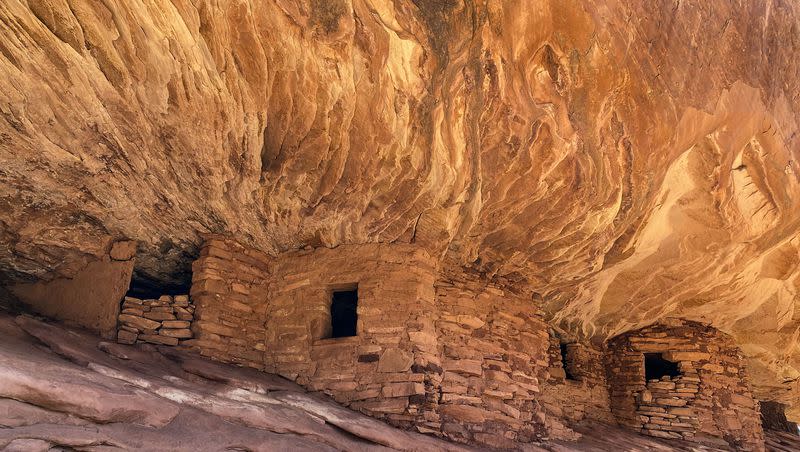Federal judge tosses Utah’s lawsuit over Bears Ears, Grand Staircase

- Oops!Something went wrong.Please try again later.
A federal judge in Utah dismissed a lawsuit brought by the state of Utah as well as Kane and Garfield counties, saying the Antiquities Act grants statutory authority to the U.S. president to issue proclamations for new monuments.
For that challenge to move forward, Judge David Nuffer wrote, the state of Utah would have had to obtain a statutory waiver from Congress, which it did not.
“The United States, as sovereign, is immune from suit save as it consents to be sued. The government consents to be sued only when Congress unequivocally expresses its intention to waive the government’s sovereign immunity in the statutory text. Without a statutory waiver by Congress, judicial review of a president’s actions is only permitted for constitutional challenges,” his decision said.
Nuffer also wrote that the Antiquities Act clearly grants discretionary authority to the U.S. president when it comes to monument designations and is not a constitutional challenge.
Related
With stroke of his pen, Biden restores Utah’s monuments. Here are 5 things you need to know
‘Political football’? Biden wants review of Bears Ears, Grand Staircase boundaries
In January 2021, before President Joe Biden restored the monuments after President Donald Trump had reduced them in size, Utah’s GOP political heavyweights warned Biden, urging him to use caution.
“For over 25 years Utah has been the center of controversial and divisive unilateral national monument decisions. Roughly two-thirds of our backyard belongs to the federal government, which has meant land management actions have often been done to us rather than with us,” the statement said.
“A review in name only with predetermined results, which ultimately leads to a unilateral executive order enlarging the monuments’ boundaries, will not solve the root of the problem and will only deepen divisions in this country,” it added.
The group included Utah’s congressional delegation as well as state officials including Gov. Spencer Cox, Attorney General Sean Reyes, Senate President Stuart Adams, R-Layton, and House Speaker Brad Wilson, R-Kaysville.
On Friday, Cox made clear the fight is not done.
“This case will ultimately be decided by the U.S. Supreme Court and today’s ruling helps us get there even sooner. The clear language of the law gives the president the authority only to designate monuments that are ‘the smallest area compatible with the proper care and management of the objects to be protected,” he said. “Monument designations over a million acres are clearly outside that authority and end up ignoring local concerns and damaging the very resources we want to protect. We look forward to starting the appeals process immediately and will continue fighting this type of glaring misuse of the Antiquities Act.”
The controversy over the Bears Ears National Monument alone has prompted in-person visits to the area by three Interior secretaries: Sally Jewel, Ryan Zinke and Deb Haaland.
Related
A Bears Ears primer: How Obama's pen could affect southern Utah
‘We all want pretty much the same thing,’ Interior Secretary Deb Haaland says after Bears Ears tour
Bears Ears currently includes 1.36 million acres of public lands and is an area rife with cultural artifacts and dwellings sacred to Native Americans. The land, which includes popular spots for rock climbing, has grandfathered uses that include ranching. Critics over its pending designation accused environmental groups — not tribal interests — in pushing for the monument.
Grand Staircase-Escalante has 1.87 million acres of public lands and led to bitter outrage in Utah when it was designated in 1996 by then-President Bill Clinton — from neighboring Arizona.
Environmental groups praised the dismissal of the lawsuit challenging the monument’s expansions.
“Grand Staircase-Escalante and Bears Ears National Monuments are two of the most significant, intact, and extraordinary public landscapes in America — landscapes that will remain protected after today’s dismissal of these lawsuits,” said Steve Bloch, legal director of the Southern Utah Wilderness Alliance.
“We are thrilled with today’s decision, which aligns with more than 100 years of similar court rulings that have rejected every challenge to presidential authority under the Antiquities Act to protect cultural, scientific, ecological, and paleontological resources on public lands.”

